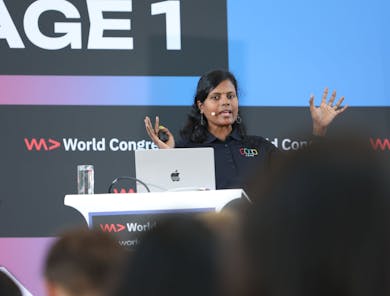Introduction
In the ever-evolving landscape of artificial intelligence, the concept of "responsible AI" has emerged as a cornerstone for ethical and practical AI implementation. During the WWC24 Panel discussion, three eminent experts—Mina, Bjorn Bringman, and Ray El Porter—shared their insights and experiences on this subject, moderated by Stefan from Business Insider.
Meet the Experts

We started the talk by introducing our panelists:
Mina Saidze - Founder of Inclusive Tech, a startup lobby and consulting organization specializing in data and AI.
Björn Bringmann - Managing Director at Deloitte, leading their AI Institute.
Ray El Porter - A seasoned AI expert and Senior Advisor to Accenture.
These experts brought a wealth of knowledge and experience to the table, offering a comprehensive perspective on responsible AI.
Defining Responsible AI
To kick things off, we tackled the increasingly complex buzzword—responsible AI.
Mina's Perspective
Responsible AI is about implementing AI ethics and AI safety, and it includes compliance with the law and setting ethical norms.
Bjorn's View
Bjorn emphasizes a human-centric approach, and sees responsible AI as a conversation starter that drives discussions around ethics and safety.
Ray's Input
Ray views it as a marketing term that's more relatable to executives and developers. Responsible AI in practice involves compliance and governance, not just philosophical debate.
"Responsible AI is a concept that transcends idealistic discussions, embedding ethical considerations into the very fabric of AI application and deployment." - Mina
The State of Responsible AI in the Private Sector
Mina critiqued the private sector for often treating AI ethics as a "nice-to-have." During economic downturns, initiatives around diversity, technology, and AI ethics are often the first to face budget cuts. She emphasized that the tech industry's focus on speed and competition frequently pushes societal implications to the back seat.
However, regulatory pressures, such as the EU AI Act, are changing the narrative. This act requires companies to assess AI models according to their associated risks. It's a significant step toward ensuring companies are more accountable.
Ray's Observations
Ray says larger tech companies lack prioritization but awareness is increasing, with issues like Chat GPT giving wrong answers have forced companies to adopt responsible AI more seriously to avoid bad press and loss of customer trust.
Bjorn echoed these sentiments, mentioning that with regulations like the EU AI Act coming into force, compliance is making its way to the top of the executive agenda. It's no longer just a legal department issue but is now a boardroom discussion.
Challenges in Implementing Responsible AI
Industry-Specific Issues
Different industries face unique challenges when it comes to implementing responsible AI:
Financial Services and Healthcare: Familiar with stringent regulations and may over-regulate, limiting innovation.
Media & Retail: Struggle with regulatory aspects but are under immense pressure due to disruption caused by AI technologies.
Bjorn highlighted that responsible AI implementation often takes 12-24 months for large organizations due to the extensive training and cross-departmental coordination required.
"Responsible AI is a cross-enterprise challenge. It requires inputs from technical, legal, and business teams, a true collaborative effort." - Ray
Smaller Organizations and Startups
For smaller companies and startups, the challenge is more pronounced due to limited resources. However, basic steps like rethinking AI guidelines and focusing on digital accessibility can still go a long way.
Mina emphasized that companies not listed on stock markets might not feel the regulatory pinch as sharply, but responsible AI still offers benefits in terms of reputation and customer trust.
Educational Blocking Points
Educating both employees and the public about responsible AI is crucial. Companies must demystify AI and make their principles transparent.
The Intersection of Compliance and Innovation
One of the standout points from the discussion was the delicate balance between compliance and innovation. While regulatory guidelines are crucial, they must not stifle innovation. Bjorn explained that a well-balanced task force is essential to navigate this tightrope, ensuring both legal compliance and fostering innovation.
Example: IBM's AI Ethics Board
- A stellar example of how governance can work effectively.
- IBM does not publish a technology if it doesn't meet their ethical standards, reflecting the financial and reputational stakes tied to responsible AI.
Practical Tools and Implementation
To make AI responsible, developers have numerous tools at their disposal. Mina suggested using tools like IBM's Trustworthy AI toolkit available on GitHub. These tools help in:
- Detecting biases in training datasets.
- Designing algorithms to mitigate over or under-representation of specific attributes.
- Using synthetic data to ensure diverse societal representation.
Internal Education and Training
Bjorn shared that Deloitte has been running AI education sessions across companies to bridge the gap between technology and business understanding. This holistic education is vital for ensuring responsible AI becomes ingrained in corporate culture.
Audience Q&A
The panel also entertained questions from the audience, highlighting two critical points:
- Educating Users on AI Responsibility and Transparency
- Focus on comprehensive education programs.
- Transparency in accountable AI principles and practices.
- Developer Tools
- Utilize publicly available toolkits like IBM's Trustworthy AI to identify and mitigate biases.
- Encourage a proactive approach to responsible AI among developers.
Conclusion
The WWC24 Panel underscored that responsible AI is more than a buzzword; it is a necessary paradigm for sustainable and ethical AI deployment. As regulatory pressures mount and public scrutiny increases, companies must integrate responsible AI principles into their strategic frameworks.
By fostering cross-departmental collaboration, educating employees, and leveraging available tools, organizations can navigate the complexities of responsible AI and turn ethical implementation into a competitive advantage.
Stay tuned for more insights and updates on AI practices that are shaping our world. And remember, responsible AI isn't just about compliance—it's about building a future we can all trust.











